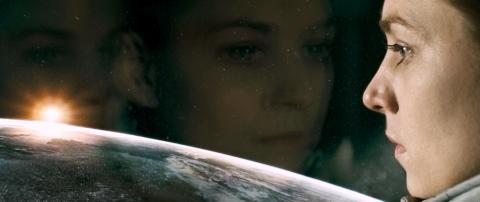Low budget sci-fi is something of an endangered species as high-tech gimmickry takes over the screen, but while there will always be a place for mega-buck blockbusters such as Avatar, it has often been the edgy shoestring films that have made the running in developing the genre. Think of the first Mad Max and the first Terminator movie, both groundbreakers that where made for relatively little money, but had tremendous influence.
Now the term “shoestring budget” can refer to a film like District 9, which was reportedly made for US$30 million. Cargo made do with less than US$5 million. Though the Swiss-made science fiction thriller manages to build a lot of atmosphere with very limited means and throws around some interesting ideas, it is too derivative to make a mark.
Cargo tells the story of Laura Portmann (Anna-Katharina Schwabroh), a medic on a deep space cargo ship purportedly resupplying the colony of Rhea, a new paradise built to relocate human populations as Earth becomes increasingly uninhabitable. Portmann is an outsider among the crew, as is Samuel Decker (Martin Rapold), a security officer added to the ship’s personnel to deal with terrorist attacks by a group who believes that Earth should not be abandoned.

photo courtesy of Jun Long International
The opening sequence is an advertisement singing the praises of Rhea, and Portmann herself has taken her current job as a way of saving money to get to this new Jerusalem. It doesn’t take long to realize that all is not as it seems, and Portmann needs to quickly work out who she can trust. There are echoes of a slew of sci-fi thrillers, most obviously Ridley Scott’s Alien (1979), but also, in its environmental issues, Douglas Trumbull’s Silent Running (1972), and some of its compositions hark back to Stanley Kubrick’s 2001: A Space Odyssey (1968).
Ivan Engler and Ralph Etter have proved adept disciples in following the work of these master filmmakers, but Cargo is largely unoriginal and never manages to emerge from under its antecessors’ shadows. Given budgetary restraints, the directors have achieved some remarkable feats in creating the looming spaces of an inter-galactic cargo ship, working hard to build a sense of dread as a straightforward mission gradually turns into a nightmare of discovery about the unreality of the world Portmann has taken for granted.
There are far too many moments when the motivation of the characters seems unclear or when they act in a way designed to simply carry the plot forward. The slow pace of the film leaves plenty of time to think about all the links that don’t make much sense. A romance between Portmann and Decker utterly fails to convince, and as this has to serve as the emotional climax of the film, it hammers the final nail into the coffin of Cargo’s aspirations.

Growing up in a rural, religious community in western Canada, Kyle McCarthy loved hockey, but once he came out at 19, he quit, convinced being openly gay and an active player was untenable. So the 32-year-old says he is “very surprised” by the runaway success of Heated Rivalry, a Canadian-made series about the romance between two closeted gay players in a sport that has historically made gay men feel unwelcome. Ben Baby, the 43-year-old commissioner of the Toronto Gay Hockey Association (TGHA), calls the success of the show — which has catapulted its young lead actors to stardom -- “shocking,” and says

Inside an ordinary-looking townhouse on a narrow road in central Kaohsiung, Tsai A-li (蔡阿李) raised her three children alone for 15 years. As far as the children knew, their father was away working in the US. They were kept in the dark for as long as possible by their mother, for the truth was perhaps too sad and unjust for their young minds to bear. The family home of White Terror victim Ko Chi-hua (柯旗化) is now open to the public. Admission is free and it is just a short walk from the Kaohsiung train station. Walk two blocks south along Jhongshan

The People’s Republic of China (PRC) invaded Vietnam in 1979, following a year of increasingly tense relations between the two states. Beijing viewed Vietnam’s close relations with Soviet Russia as a threat. One of the pretexts it used was the alleged mistreatment of the ethnic Chinese in Vietnam. Tension between the ethnic Chinese and governments in Vietnam had been ongoing for decades. The French used to play off the Vietnamese against the Chinese as a divide-and-rule strategy. The Saigon government in 1956 compelled all Vietnam-born Chinese to adopt Vietnamese citizenship. It also banned them from 11 trades they had previously

The 2018 nine-in-one local elections were a wild ride that no one saw coming. Entering that year, the Chinese Nationalist Party (KMT) was demoralized and in disarray — and fearing an existential crisis. By the end of the year, the party was riding high and swept most of the country in a landslide, including toppling the Democratic Progressive Party (DPP) in their Kaohsiung stronghold. Could something like that happen again on the DPP side in this year’s nine-in-one elections? The short answer is not exactly; the conditions were very specific. However, it does illustrate how swiftly every assumption early in an